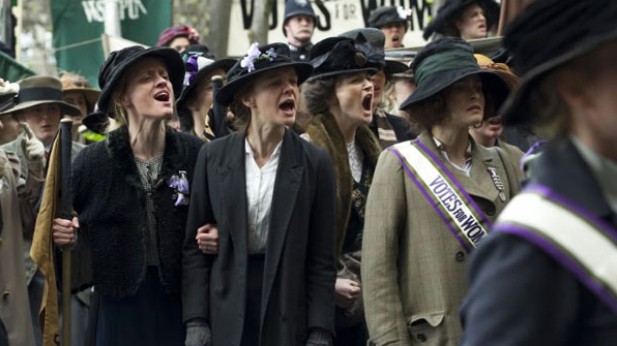
Written by Abi Morgan
Directed by Sarah Gavron
UK, 2015
As the high-profile spearhead of UK film culture, the London Film Festival thrives on promoting the heritage films that its indigenous industry clings to so dearly: the historical and period dramas which keep the production designers, wardrobe wranglers and most of the Royal Shakespeare Company solvent throughout another procurement drive of Elizabethan ruffs, period-accurate WREN uniforms and Victorian fainting couches. Last year the festival opened with the Second World War espionage thriller The Imitation Game, and this year the opening gala focus is turned to Britain’s history of female emancipation which won women the vote through a long and bitter political campaign against the patriarchal status quo. Quite how long and brutal this struggle was will be shocking to some (this reviewer included), as recent revelations from parliamentary records and the excavation of supressed law enforcement records build a quite different historical picture to that usually offered in popular culture or the education curriculum.
Suffragette stars Carey Mulligan as Maud Watts, a poverty-stricken denizen of a East End workhouse circa 1912, struggling to raise her sickly kid with her initially sympathetic husband (Ben Whishaw). Change is afoot with the nascent woman’s suffragette movement engaged in non-violent forms of resistance, causing minor property damage and agitating in the streets for the same basic rights as their husbands and sons, fathers and uncles. Maud’s particular interest in the movement is piqued through interactions with her doctor Edith Ellyn (Helena Bonham Carter) and firebrand friend Violet Miller (Anne-Marie Duff), whom she is forced to substitute for in a Parliamentary deposition concerning the working conditions at her Bethnal Green workhouse. When the representations and peaceful politicizing fall on deaf ears, the movement resorts to more disruptive and dangerous methods to make their voice heard, with the inevitable chain reaction on the social and financial security who sneer at the ‘uppity’ women who should remain in their discrete, meek place. The forces of authority are personified in Special Branch officer Arthur Steed (Brendan Gleeson) whom you’d think would be concentrating his limited resources on genuine threats to the crown, e.g. the immediate and genuine danger from the likes of Irish Republican Nationalist insurgents or the growing cloud of war in continental Europe, instead of demonizing the movements charismatic leader Emmeline Pankhurst (Meryl Streep) as public enemy number one.

Although the outcome is common knowledge, the depth and brutality of the struggle to secure the fundamental right to vote will be shocking to many, as the common image of well-heeled middle-class professional women diligently marching to effect a drip effect step-change couldn’t be further from the truth. This decades-long fight was ugly and violent. As the film makes abundantly clear, men and women who supported the cause were ostracized for their efforts, losing their careers, their marriages and even their children, not to mention suffering frequent and repeated incarceration, making them resort to hunger strikes amidst violent reprisals. The film pitches the struggle as a gender-based fight for equality as much as it was a class issue, with exhausted women working eighteen-hour days in grueling workhouses while still being expected to be matronly paragons of motherhood when they returned home to conduct the expected child-rearing and homemaking activities, while being paid 60% of the wages of their (also exploited) male comrades for the privilege. The establishment cronies sneer at women who ‘spit out children’ and ‘always marry violent drunks’, while, in one brilliantly observed moment, Alice Haughton (Romola Garai), an upper class member of polite establishment, is seen trying to bail out her financially disenfranchised comrades after another brutal incident of violent oppression. Unfortunately, her efforts are denied as the system requires her husband to countersign any expenditure, even when the money is coming from her own bank account.
Meryl Streep’s role is in reality a two-minute cameo, which one assumes was engaged to help sell the film in foreign markets, as evidently screenwriter Abi Morgan and director Sarah Gavron felt that a far more effective route to tap modern resonance was to see the fight through the eyes of a radicalized woman who is more immediately empathetic than an entitled bourgeois agitator. This grasp for vérité seeps through to the hand-held camerawork and use of genuine deprived East End London locations, and the expected high quality of the costumes and set dressing that these period films always excel at. While nuanced in places, the script follows the usual story arc of induction, fall from grace and final equilibrium of redemption, so there are few surprises in Maud’s slow and shaded political awakening, as the film is centered on Carey Mulligan’s fragile performance. For a festival being sold on its core themes of female representation, Suffragette is an ideal aperitif, even as it closes with some shocking statistics of exactly when 50% of the world’s population gained emancipation, which didn’t occur for another decade in the United Kingdom after the events of the film. A final postscript reinforces the sobering point that, in some parts of the world, women are still denied basic human rights today, so the fight continues on.

